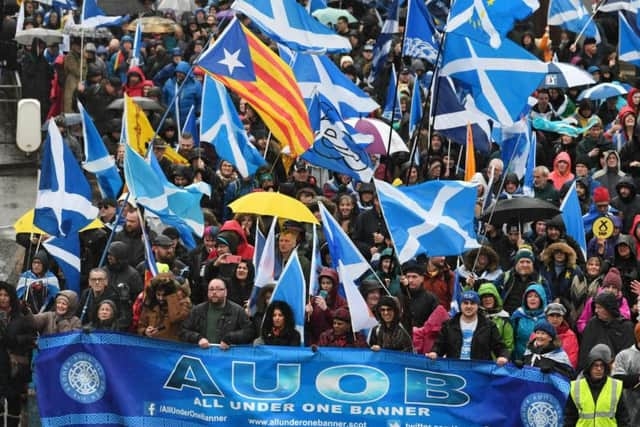Scottish independence: Why marches serve a useful purpose for IndyRef2 supporters
Another month, another political rally in Glasgow. Scotland's biggest city is no stranger to marches or demonstrations, but the scale of them has increased greatly in the years since the 2014 referendum.
All Under One Banner (AUOB) may have started off as a fringe organisation but it now finds itself a familiar part of the Scottish political landscape. The non-party group plans to stage eight pro-independence marches across towns and cities north of the Border in 2020 alone.
Advertisement
Hide AdAdvertisement
Hide AdIts first event of the year saw tens of thousands of participants shrug off some dismal January weather to march from Kelvingrove Park to Glasgow Green.


As usual with the AUOB marches, the event was well-behaved and family friendly. People of all ages demonstrated their democratic right to freely assemble in support of a political cause they passionately believe in - in this case, the demand to stage an IndyRef2.
The right to march is a cornerstone of UK democracy - but few campaign groups have ever tried to stage so many large-scale events on such a regular basis.
Smile for the cameras
The marches are a useful tool for the pro-independence campaign as they offer a visual shorthand of popular support. Newspapers and websites around the world regularly illustrate stories on the continuing Scottish independence debate with a picture taken at one of AUOB's events.
Fringe nationalists used to argue on social media that pro-independence marches were being deliberately ignored by national broadcasters and newspapers. Yet reporters were out in force at Saturday's event - not to mention numerous press photographers and camera crews.
Supporters of Scotland's place in the Union tend to dismiss such marches as irrelevant. Walking several miles in the pouring rain counts for nothing come polling day.
But in the aftermath of last month's general election - which saw the SNP sweep the board for a second time in five years - Saturday's procession goes someway to illustrate the seemingly boundless enthusiasm that exists among pro-independence activists. These are folk who are ready to chap doors and hand out leaflets if an IndyRef2 is ever called.
The company you keep
Several senior Nationalists were happy to take part in Saturday's march and share pictures on their social media. Nicola Sturgeon didn't attend - but did send a good luck message before it got underway.
Advertisement
Hide AdAdvertisement
Hide AdAUOB is not affiliated with the SNP and its events are organised with no input from the party. It's an arrangement that suits both sides.
The SNP is happy to keep such marches at arms' length. Scottish independence is a genuine cross-party campaign - but everyone knows that one party in particular dominates, given its resources and number of MSPs and MPs.
Supporting grass roots independence events shows the SNP is willing to allow others to join in. But it also allows the Nationalists the chance to distance the party from elements it doesn't like.
It was telling that none of the elected representatives who were happy to be pictured taking part in Saturday's march turned up for the brief AUOB press conference held after the event.
Among the speakers was former Scottish Socialist Party leader - and convicted perjurer - Tommy Sheridan. There are some in the SNP who would flatly refuse to ever share a stage with Mr Sheridan, given his political baggage.
Also speaking was former UK ambassador Craig Murray, who was blocked by SNP bosses from standing as a candidate in the 2015 general election - despite winning approval of local members in Airdrie.
That decision prompted Mr Murray to write on his blog in 2014: “Those in the SNP who make a fat living out of it are terrified the energy of the Yes campaign may come to threaten their comfy position.”
Placards
AUOB is at pains to point out it is an umbrella organisation. It claims to welcome all supporters of independence - regardless of political affiliation.
Advertisement
Hide AdAdvertisement
Hide AdBut some Unionists were distinctly uncomfortable at some of the messages on display at Saturday's event.
One large placard - a picture of which was shared widely on social media - proclaimed "F*** Off You Tory C****". The banner in question carried the logo of Class War - a loose collective of anarchists that achieved notoriety in the early 1980s. It's unlikely that SNP strategists would welcome them into a formal IndyRef2 campaign.
The Socialist Workers' Party (SWP) was also in attendance. It has a habit of turning up at any large-scale outdoor political rally. Its members were kept busy handing out some strongly-worded placards - one of which demanded "Break Up the British State" - to unsuspecting marchers.
Thomas Kerr, a Conservative councillor on Glasgow City Council, hit out at the anti-Tory "hatred" he received following Saturday's march.
Mr Kerr, who was first elected in 2017, questioned what he called another "fingers in ears" moment for the SNP leadership after receiving a barrage of abuse online.
Going forward
AUOB will be more than satisfied with how Saturday's march panned out in terms of participation and media coverage. Yet the question remains: do such events actually increase support for independence?
Recent polling shows support for a Yes vote has crept above the 45 per cent achieved in 2014. But it is the No side that has consistently held a lead in the polls in the past five years, even after Brexit.
The dilemma facing pro-independence supporters remains much the same in 2020 as it was in 2013. How do you persuade a majority of voters, many of whom have an emotional attachment to the Union, to support the break-up of the UK? Placards telling the Conservatives - a party backed by more than 600,000 Scots at last month’s election - where to go does not seem like the answer.